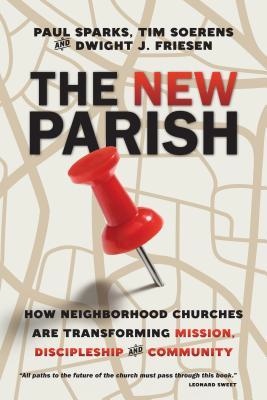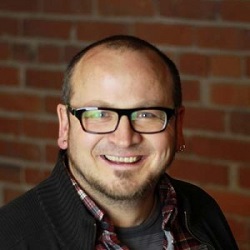 ReImagine Vancouver (December 2 – 3) is “designed for leaders and practitioners who are starting something new, revitalizing the local church through new expressions and deepening their church’s faithful presence in their neighbourhood.”
ReImagine Vancouver (December 2 – 3) is “designed for leaders and practitioners who are starting something new, revitalizing the local church through new expressions and deepening their church’s faithful presence in their neighbourhood.”
Leading the way at St. Andrew’s Hall on the UBC campus will be three men – Paul Sparks, Tim Soerens and Dwight Friesen – who have demonstrated their care for authentic church presence in local communities through The New Parish, Inhabit Conference, Parish Collective and many other avenues.
The following piece is an extract from The New Parish: How Neighborhood Churches are Transforming Mission, Discipleship and Community.
For several years the three of us have been connecting with churches rooted in the neighbourhood. Everywhere we go, we find the Spirit working miracles of transformation through their shared life together in the parish. The consistent storyline is so encouraging. When these faith communities begin connecting together, in and for their neighbourhood, they learn to depend on God for strength to love, forgive and show grace like never before.

Paul Sparks
We’ve also been inspired by the way these groups reach outward in love and care toward the neighborhood at large. The gospel becomes so much more tangible and compelling when the local church is actually a part of the community, connected to the struggles of the people and even the land itself . . .
Popular imagination holds that North American churches are dwindling away, frozen in irrelevance and dying from divisiveness. Many books on the church in recent years highlight statistics that speak of the church’s decline in the Western world.
While it is certainly true that all is not well within popular Christianity, those collecting the data may be asking the wrong questions. The persistent questions regarding Sunday-morning attendance, program involvement or the building budget may not be the wisest measurements for discerning the health of the church.
The new parish introduces the possibility that something spectacular is brewing beneath the level of categorical definition. Indeed, there is an immense distributed population, often unrecognized by official figures, who are learning to love their neighbours in everyday ways.
Within a single mile of wherever you are reading this book, it’s quite likely that there are dozens upon dozens of people who are loving their neighbour as an expression of their love of God. And here’s what we find most exciting; right now there are millions more migrating toward this relational way of being the church.
Over the course of the past few years we have walked the streets, eaten in the homes and entered the shops, gardens and ghettos of over 300 diverse neighbourhoods across North America. We have been on an expedition to discover coalescing local bodies of believers sharing life together in particular places.
Throughout the course of our explorations we have stumbled on a very surprising phenomenon. Contrary to all the clamour about dying churches, the closer we get to the everyday life of people in their neighbourhoods, the more we find burgeoning expressions of reconciliation and renewal.
Our dear friend Brandon Rhodes, a longtime member of the Springwater faith community in Lents, Portland, has guided us through his neighbourhood, where on one strip there are five different church buildings representing five different denominations. While each church is struggling to survive and suffering from dwindling congregations, there is another story at play in the area.
From simple acts of hospitality, garden sharing, urban farm harvest parties and intersection repair projects, Springwater is a tangible expression of God’s love in the real life of the neighbourhood.
Along with the neighbourhood friends they have encountered along the way, members of Springwater are weaving together the fabric of love and care across the parish. Their lives bear witness to another way of living together in every dimension of life. But you would never notice this by looking at those five church buildings.
A simple switch of the imagination can produce a whole new set of questions regarding the health of the church. Here are just a few that we ask our hosts when we are visiting communities. These questions also serve as prayers as we invite God to lead our exploration. What would you ask if you were surveying neighbourhoods, searching for signs of the Spirit’s movement.
* Are there people who have found a way to share a life of love together here?
* Are there people leading movements toward reconciliation and renewal here?
* Are there people living on behalf of justice with the marginalized and poor here?
* Are there people entering into relational forms of civic and economic life here?
* Are there people creating reciprocal relationships of care across parishes globally here?
If we begin to ask different questions, we get different answers regarding the state of the church. What if more and more of us were on the lookout for the Spirit’s movement, bearing witness to signs of new hunger for reconciled friendships, cooperative collaboration and the responsible stewardship of the place we live?
What is critical for receptivity to the new endeavour is the capacity to see how the Spirit may be at work in both the institutional church and the world at large. Both parties are finding themselves drawn from different directions toward a shared centre.
Throughout this text you will see a constant dialectical movement between the work of the Spirit in reforming the church and the love of God in the neighbourhood, drawing it toward reconciliation and renewal.
 Learning to see the immeasurable and radical forces at play will require a new lens. It will require a new imagination that expands beyond our current concept of church and begins to track new patterns of renewal at work in the world. Ultimately, learning to see will require reorientation, new postures and new ways of practicing faith.
Learning to see the immeasurable and radical forces at play will require a new lens. It will require a new imagination that expands beyond our current concept of church and begins to track new patterns of renewal at work in the world. Ultimately, learning to see will require reorientation, new postures and new ways of practicing faith.
Taken from The New Parish by Paul Sparks, Tim Soerens and Dwight J. Friesen.
Copyright(c) 2014 by Paul Sparks, Tim Soerens and Dwight J. Friesen. Used by permission
of InterVarsity Press, PO Box 1400, Downers Grove, IL 60515.
For The New Parish website, go here.
Go here for more information on ReImagine Vancouver, or to register.


